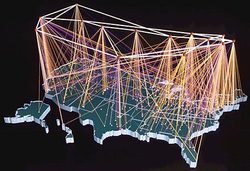Following is the essay you can designate as Volume 10, Number 25 of
This Week’s Clue, based on the e-mail newsletter I have produced since
March, 1997. It would be the issue of June 18.
Enjoy.
 Regular readers here will note that I have been posting less than usual this week.
Regular readers here will note that I have been posting less than usual this week.
There is a reason for that. I’ve been “off the grid.”
It wasn’t intentional. A lightning strike Monday evening knocked out our cable modem. I requested some urgency in getting me back into business.
I learned there’s a difference between cable “urgency” and phone “urgency.” On Wednesday afternoon a cable lady in a truck finally arrived and confirmed what I knew from the beginning, that the problem wasn’t with my home, my wire, or my modem. This morning the “expert” arrived, and he’s been going from pole-to-pole, sometimes coming inside to confirm I’m still not back online.
I’m lucky. I’ve got a laptop. I’ve spent two mornings and an afternoon now WiFi-in, getting the vital work of ZDNet and Voic.Us done. But it’s not the same as working from your own office. I can’t feed all my blogs. It’s hard to just walk away for a few minutes, to rest my eyes and think, which (whether you believe it or not) is something I actually like to do while writing.
This is the longest break I’ve had from broadband, except for travel, since 1998. For 13 years before that I was online for hours each day via modem, filing stories, checking the wires, checking newsgroups or forums.
This week has been a unique opportunity to see just how thoroughly the Web has changed the way we live. Or at least how I do.
Without the Web I am no longer tied to the news. Cable and newspapers are weak substitutes. I want to know what’s going on in open source right now, what’s happening at the old school, with my favorite team. I know all about Paris Hilton, but not much else.
I want to know what’s happening where my friends live, all around the world. I want to know what they think. And it’s gotten spotty, sporadic, kind of a bit-o-pause you might say.
I have gotten terribly spoiled in my workstyle. I expect to be able to find all the background I need on any subject, nearly instantly, and be able to link that right into my stories, with just a few mouse clicks. I can’t. I’m left with the content of my own head and my own library, which now looks like a very shallow pond indeed, much smaller than I remember it being in those spring days before I met the Web.
I can’t see which videos I might be getting next. I can’t check my bank balance. My son can’t get customer service on his games. I don’t know what people are thinking about things I care about, at all. I can’t get my e-mail. I can’t IM. I can’t YouTube.
And I feel disconnected from you.
This time has also enabled me to think more about what the Web can be, what it should be, and what it’s not right now.
It’s not widely available, and it’s not very fast, although by now it should be. Wired speeds have not increased in a decade, and thus the speeds available to WiFi users haven’t gone up, either.This is outrageous.
Mobile Internet costs far too much, and offers far too-little, so here’s an easy prediction for me to make. The iPhone will not be a wild success. AT&T is going to cripple it, try to get big money for every bit going through it, and the market will resist. Sprint is charging $90/month for mobile broadband, a charge that goes on top of other phone and data charges tacked onto your bill, and their customer service is completely non-existent. You think AT&T is suddenly going to open the data floodgates for Apple users? Not on your tintype.
Politics has succeeded, in this decade, in stopping Moore’s Law dead in its tracks. The preference of the American Administration for monopolies, or something like them, to real competition in order to control the leaders of those monopolies and, thus, everyone else, is pushing America further-and-further behind the rest of the world. It’s the rule of the Clueless.
It will continue to push us to the back of the line until the current power logjam is broken, and new leaders are able to gain effective control of the levers of power. That won’t happen by magic on January 21, 2009, no matter what the cable talking heads tell you.
I have also learned just how essential America remains. Despite my contrary hopes, progress has not jumped-ahead in Europe, or in Asia. Engineers there are only very slowly seizing the software, service, and scientific markets we have abandoned. Most of our economic partners have not changed their strategies, nor the pace of their own technology development, to make up for the shortfall here. If anything, they have slowed, because they miss our input.
How long will this remain the case? It’s hard to tell. But until things change, I’m not the only person who is off the grid.














“Sprint is charging $90/month for mobile broadband, a charge that goes on top of other phone and data charges tacked onto your bill . . . ”
That should be $60, not $90. Sprint, AT&T, and Verizon all charge the same thing for PC Card 3G access, $80 standalone or $60 on top of a voice account. What’s interesting is that if you have a smart phone, that $60 becomes $40 for AT&T and Verizon and just $25 for Sprint. Also interesting is that Sprint is more lenient about letting you use your smart phone as a modem for your laptop. Verizon actively discourages this, disabling supporting features in phones. I haven’t heard much about AT&T here, maybe because most 3G users prefer the so far more widely available EVDO networks.
“Sprint is charging $90/month for mobile broadband, a charge that goes on top of other phone and data charges tacked onto your bill . . . ”
That should be $60, not $90. Sprint, AT&T, and Verizon all charge the same thing for PC Card 3G access, $80 standalone or $60 on top of a voice account. What’s interesting is that if you have a smart phone, that $60 becomes $40 for AT&T and Verizon and just $25 for Sprint. Also interesting is that Sprint is more lenient about letting you use your smart phone as a modem for your laptop. Verizon actively discourages this, disabling supporting features in phones. I haven’t heard much about AT&T here, maybe because most 3G users prefer the so far more widely available EVDO networks.